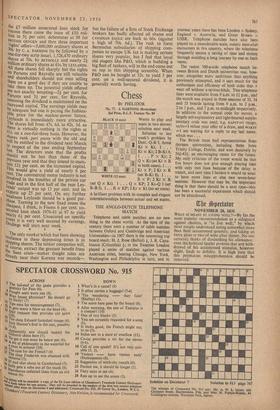Chess
BY PHILIDOR
No. 77. J. HARTONG (Rotterdam) 2nd Prize, B.C.F. Tourney No. 80 . BLACK (8 men)
Winirr to play and mate in two moves: solution next week.
R-B 5). 1 R x KP; 2 Kt x Kt (no set mate).
A brilliant problem with its complex and elegant interrelationships between actual and set mates.
THE ANGLO-DUTCH TELEPHONE MATCH Telephone and cable matches are no new thing in the chess world. At the turn of the century there were a number of cable matches between Oxford and Cambridge and American Universities-in 1907 there is the interesting top board result: H. J. Rose (Balliol) 1, J. R. Capa- blanca (Columbia) ; in the Twenties London played a series of matches against various American cities, beating Chicago, New York, Washington and Philadelphia in turn, and in
WHITE (12 men) postwar years there has been London v. Sydney, England v. Australia, and Great Britain v. USSR. Telephone matches have also been played on a considerable scale, mainly inter-club encounters in this country, where the telephone frequently means a saving of time and money through avoiding a long journey by one or both teams.
The recent 100-a-side telephone match be- tween British and Dutch universities was, how- ever, altogether more ambitious than anything previously attempted, and it says much for the enthusiasm and efficiency of both sides that it went off without a serious hitch. Two telephone lines were available from 9 a.m. to 12 p.m., and the match was played in three sessions of 33, 34 and 33 boards lasting from 9 a.m. to 2 p.m., 2 to 7 p.m., and 7 p.m. to midnight respectively. In addition to the normal code for moves, a largely self-explanatory and light-hearted supple- mentary code was used, e.g. KAPUT=1 resign, NUTS=I refuse your offer of a draw, and WAKEY =1 am waiting for a reply to my last move, which was .
The British team had representatives from thirteen universities, including three from Trinity College, Dublin, and won decisively by 56i-43i, an encouraging omen for the future. My only criticism of the event would be that five hours does not give enough playing time with only two lines because of the delay in transit, and next time I believe it would be wiser to have more lines or else two seven-hour sessions. However that may be, the important thing is that there should be a next time-this has been a successful experiment which should not be abandoned.










































































 Previous page
Previous page